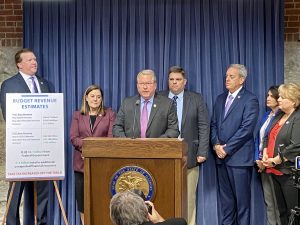Republicans reject partisan budget
 While most Illinoisans were asleep during the overnight hours of May 31-June 1, a 3,088-page budget and 839-page budget implementation (BIMP) bill was filed in Springfield. The bills were voted on within minutes of arriving in the House of Representatives, and an hour later they arrived in the Senate. With almost no time to digest the contents and no committee hearing on either bill, around 2:30 AM, bills that guide spending for the fiscal year that begins July 1, 2021 were approved and sent to the Governor.
While most Illinoisans were asleep during the overnight hours of May 31-June 1, a 3,088-page budget and 839-page budget implementation (BIMP) bill was filed in Springfield. The bills were voted on within minutes of arriving in the House of Representatives, and an hour later they arrived in the Senate. With almost no time to digest the contents and no committee hearing on either bill, around 2:30 AM, bills that guide spending for the fiscal year that begins July 1, 2021 were approved and sent to the Governor.
I voted against the $42 billion state budget and the BIMP. The FY22 budget relies on more than $666 million in job-killing taxes and decimates a bipartisan agreement made in 2019 between Democrats and Republicans, where Republicans put votes on a tax increase in exchange for the implementation of economy-boosting, pro-jobs incentives as part of the Rebuild Illinois capital program. Prior to the vote, I joined a few of my Senate colleagues for a press conference, and I spoke about the importance of being an honest broker in Springfield. Click here to watch my remarks during that press conference.
The budget also includes a pay raise for legislators. This, while those who crafted the budget decided to short-change funding for the developmentally disabled, leaving Illinois near the bottom of the list of 50 states in its funding for those with developmental disabilities. In short, the FY22 budget reflects hyper-partisanship at the highest levels.
As one of two Senate Republican budgeteers who were supposed to have a seat at the table for budget negotiations, I can tell you that Republicans were completely shut out of the process of taking budget requests from state departments that were made at appropriations committees, and creating the actual spending plan that allocates dollars to budget areas.
However, there were a few positives in the FY 22 budget. Thanks largely to pushback from Senate Republicans, each of the items below, which was initially listed as on the chopping block or on a list to be swept or reduced, was not cut or reduced in the final budget:
- Full funding for schools based on the new evidence-based funding formula
- No reduction in the tax credit scholarship fund that allows children attending failing schools to attend a different school
- Local Government Distributive Funds (LGDF) remain whole at 100%
- Road Fund money was not diverted
- Sales tax revenue for RTA and downstate transit was kept whole at 100%
Gerrymandered district map passed
Less than 24 hours after it was introduced, the bill creating new Illinois House and Senate districts was passed by the Senate and House last Friday. After promising a transparent and inclusive process, ultimately the map was drawn in a back room behind a locked door where a select group of politicians from the majority party met to select which voters they would represent. Just like the final draft of the budget, there was no transparency in this process whatsoever. It was done solely for partisan gain using unreliable population estimates rather than concrete U.S. Census data.
When Governor Pritzker was gubernatorial candidate Pritzker, he repeatedly promised to veto maps drawn by politicians or their staffs. We are watching closely to see if the Governor keeps that pledge, or if that promise was nothing more than empty words used to gain votes.
Most of trailer fee increase rolled back
Ever since small trailer registration fees jumped by 666% in 2019 (from $18 to $118 per year), many legislators have been fighting to see that fee brought back down to reasonable levels. Thankfully, legislation passed in the final days of session to reduce the trailer fee to $36. I would have preferred to have seen the fee reduced back down to $18, but at $36 the fee is much more palatable.
Ethics bill passes, much more work needed
 With every new indictment or arrest of an elected official, the people of Illinois lose more faith in their government. Through give-and-take bipartisan negotiations, on May 31 members of the General Assembly took a significant step forward in delivering real ethics reform. Through Senate Bill 539, we will hold elected officials to a higher ethical standard and we will empower our Legislative Inspector General (LIG) to independently investigate allegations of political corruption without first having to obtain permission to investigate from a panel of sitting lawmakers. This new level of autonomy is a crucial element of the reforms we passed today.”
With every new indictment or arrest of an elected official, the people of Illinois lose more faith in their government. Through give-and-take bipartisan negotiations, on May 31 members of the General Assembly took a significant step forward in delivering real ethics reform. Through Senate Bill 539, we will hold elected officials to a higher ethical standard and we will empower our Legislative Inspector General (LIG) to independently investigate allegations of political corruption without first having to obtain permission to investigate from a panel of sitting lawmakers. This new level of autonomy is a crucial element of the reforms we passed today.”
SB 539 includes the following provisions:
- Allows the Legislative Inspector General to initiate a political corruption investigation without approval from the Legislative Ethics Commission;
- Reforms and strengthens the statement of economic interest disclosures by adding new disclosure requirements for legislators and their spouses, including disclosure of debts; and
- Prohibits legislators from leaving office and lobbying the General Assembly during the term they were sworn into for six months;
- Requires consultants to register and for lobbyists to disclose any contractual relationship with a consultant for the purpose of influencing the legislature;
- Prohibits fundraisers across Illinois on session days or the day before or after a session day;
The original ethics bill included much more watered down provisions, but Republicans were able to bring ideas to the table and help craft a more robust ethics package. Still, we have a lot more work to do to raise ethical standards in this state. Improvements in a future ethics bill should include providing the LIG with subpoena powers, a provision that allows the Illinois Attorney General the ability to use a statewide grand jury to investigate, indict, and prosecute public corruption crimes, and an even stronger legislator-to-lobbyist revolving door.
Senate leaves Springfield without taking up controversial Prisoner Review Board appointments
After weeks of requests by members of the Senate Republican Caucus, the Senate Executive Appointments Committee failed to take up the 10 pending Pritzker appointees to the Prisoner Review Board, who are actively serving and making controversial parole decisions.
Between March 2019 and April 2019, Gov. Pritzker appointed four individuals to the Prisoner Review Board, which is a body that determines if convicted felons should be released from prison. The Illinois Constitution requires that these appointees be confirmed by the Illinois Senate within 60 session days. In March 2021, the clock was approaching the 60 session days and the Senate had failed to take up their confirmation.
Rather than the Senate taking a vote on these individuals, Gov. Pritzker withdrew their appointments and reappointed them just days later, which reset the 60-day clock. Therefore, these four appointees have been serving for over two years and continue to make potentially dangerous decisions, all while Democrat Senate leaders continue to provide the Governor cover by not forcing them to testify in front of the Senate Executive Appointments Committee and failing to vote on their confirmation.
Additionally, Gov. Pritzker has appointed another six appointees to the Prisoner Review Board between February 2021 to May 2021, none of which have been confirmed either. This makes a total of 10 unconfirmed appointees who are currently serving on the 14-member Prisoner Review Board without ever being approved by the Senate.
Democrats attempt to hijack Illinois Supreme Court
Majority Party leaders managed to ram through and pass new Illinois Supreme Court districts, despite never doing so for about 60 years, and despite the Illinois Constitution not requiring it. Their excuse for doing so is to address population disparity. However, these new districts still include a population disparity of more than 200,000 people.
Senate Republicans argue that the remap is a direct result of the Democratic Party being fearful of losing their partisan influence in the higher court. This fear comes from last November when Thomas Kilbride, a Democrat justice from the Third Supreme Court District, lost his vote for retention. This was the first time that an Illinois Supreme Court justice had lost a retention election since the process was created in 1964.
This retention failure now threatens the Democrats’ 4-3 advantage on the Illinois Supreme Court. In much the same way that legislative Senate and House districts were redrawn to protect Democrat control in Illinois, the newly-drawn Supreme Court map all but guarantees Democrats will retain their 4-3 advantage on the state’s highest court.
Unresolved issues remain as session adjourns
While the Senate and House adjourned after passing a slew of bills in the final days of May and into June 1, several bills stalled as negotiations broke down. We have been told we may return to the Capitol later this month to take up legislation on some additional issues, including:
- Energy
- FOID
- Chicago elected school board
- Gaming
It is important to note that as of June 1, a supermajority vote is required to pass legislation. In the Senate a minimum of 36 of the 59 will be required, and in the House a minimum of 71 of the 118 votes will be required. This makes bill passage of any controversial measure extremely difficult.

